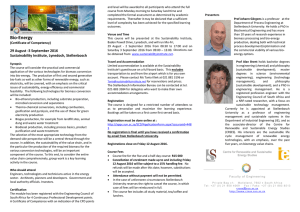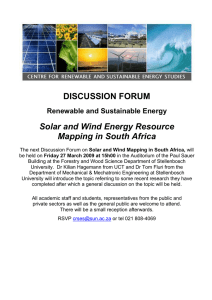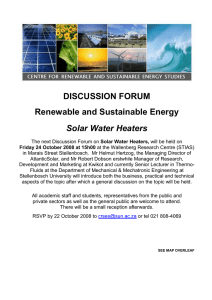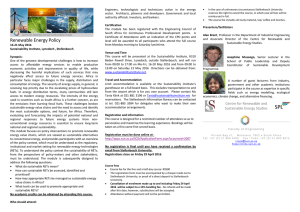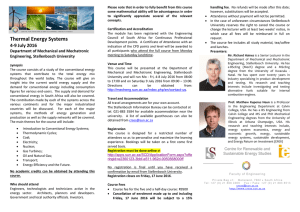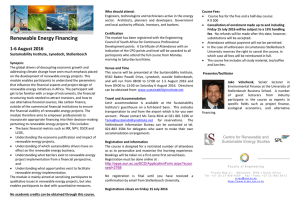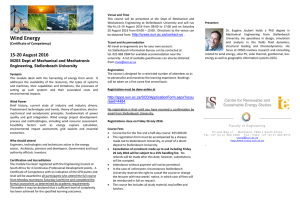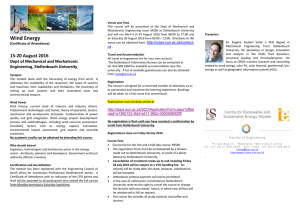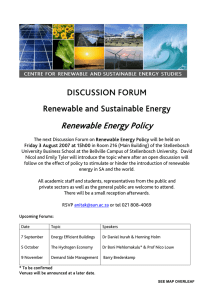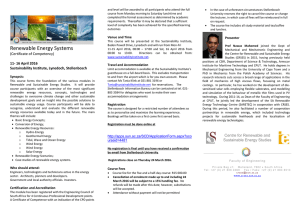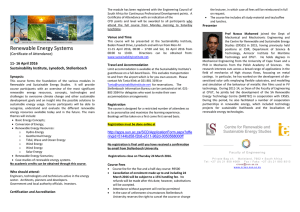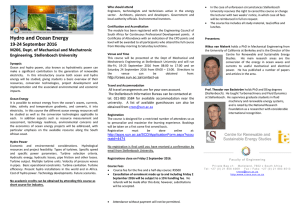Venue and Time Baden Powell Drive, Lynedoch, and will run Mo-Fri,
advertisement
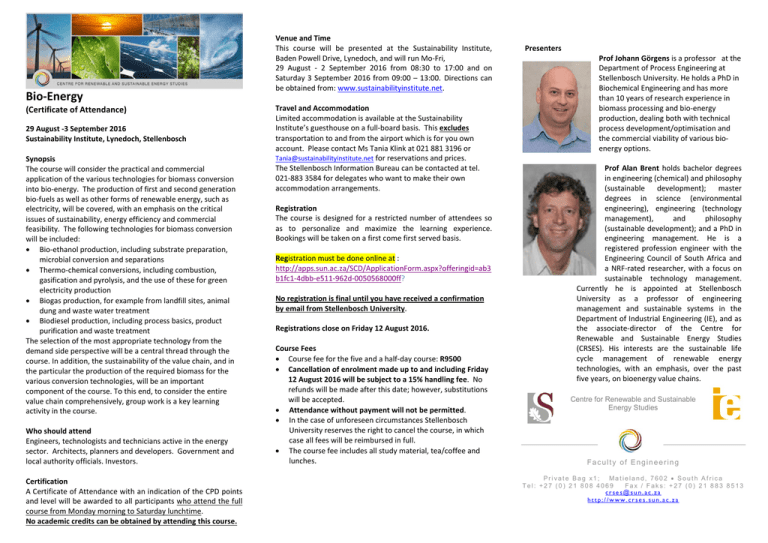
Bio-Energy (Certificate of Attendance) 29 August -3 September 2016 Sustainability Institute, Lynedoch, Stellenbosch Synopsis The course will consider the practical and commercial application of the various technologies for biomass conversion into bio-energy. The production of first and second generation bio-fuels as well as other forms of renewable energy, such as electricity, will be covered, with an emphasis on the critical issues of sustainability, energy efficiency and commercial feasibility. The following technologies for biomass conversion will be included: • Bio-ethanol production, including substrate preparation, microbial conversion and separations • Thermo-chemical conversions, including combustion, gasification and pyrolysis, and the use of these for green electricity production • Biogas production, for example from landfill sites, animal dung and waste water treatment • Biodiesel production, including process basics, product purification and waste treatment The selection of the most appropriate technology from the demand side perspective will be a central thread through the course. In addition, the sustainability of the value chain, and in the particular the production of the required biomass for the various conversion technologies, will be an important component of the course. To this end, to consider the entire value chain comprehensively, group work is a key learning activity in the course. Who should attend Engineers, technologists and technicians active in the energy sector. Architects, planners and developers. Government and local authority officials. Investors. Certification A Certificate of Attendance with an indication of the CPD points and level will be awarded to all participants who attend the full course from Monday morning to Saturday lunchtime. No academic credits can be obtained by attending this course. Venue and Time This course will be presented at the Sustainability Institute, Baden Powell Drive, Lynedoch, and will run Mo-Fri, 29 August - 2 September 2016 from 08:30 to 17:00 and on Saturday 3 September 2016 from 09:00 – 13:00. Directions can be obtained from: www.sustainabilityinstitute.net. Travel and Accommodation Limited accommodation is available at the Sustainability Institute’s guesthouse on a full-board basis. This excludes transportation to and from the airport which is for you own account. Please contact Ms Tania Klink at 021 881 3196 or Tania@sustainabilityinstitute.net for reservations and prices. The Stellenbosch Information Bureau can be contacted at tel. 021-883 3584 for delegates who want to make their own accommodation arrangements. Registration The course is designed for a restricted number of attendees so as to personalize and maximize the learning experience. Bookings will be taken on a first come first served basis. Registration must be done online at : http://apps.sun.ac.za/SCD/ApplicationForm.aspx?offeringid=ab3 b1fc1-4dbb-e511-962d-0050568000ff? No registration is final until you have received a confirmation by email from Stellenbosch University. Registrations close on Friday 12 August 2016. Course Fees • Course fee for the five and a half-day course: R9500 • Cancellation of enrolment made up to and including Friday 12 August 2016 will be subject to a 15% handling fee. No refunds will be made after this date; however, substitutions will be accepted. • Attendance without payment will not be permitted. • In the case of unforeseen circumstances Stellenbosch University reserves the right to cancel the course, in which case all fees will be reimbursed in full. • The course fee includes all study material, tea/coffee and lunches. Presenters Prof Johann Görgens is a professor at the Department of Process Engineering at Stellenbosch University. He holds a PhD in Biochemical Engineering and has more than 10 years of research experience in biomass processing and bio-energy production, dealing both with technical process development/optimisation and the commercial viability of various bioenergy options. Prof Alan Brent holds bachelor degrees in engineering (chemical) and philosophy (sustainable development); master degrees in science (environmental engineering), engineering (technology management), and philosophy (sustainable development); and a PhD in engineering management. He is a registered profession engineer with the Engineering Council of South Africa and a NRF-rated researcher, with a focus on sustainable technology management. Currently he is appointed at Stellenbosch University as a professor of engineering management and sustainable systems in the Department of Industrial Engineering (IE), and as the associate-director of the Centre for Renewable and Sustainable Energy Studies (CRSES). His interests are the sustainable life cycle management of renewable energy technologies, with an emphasis, over the past five years, on bioenergy value chains. Centre for Renewable and Sustainable Energy Studies Faculty of Engineering Private Bag x1; Matieland, 7602 • South Africa Tel: +27 (0) 21 808 4069 Fax / Faks: +27 (0) 21 883 8513 crses@sun.ac.za http://www.crses.sun.ac.za
